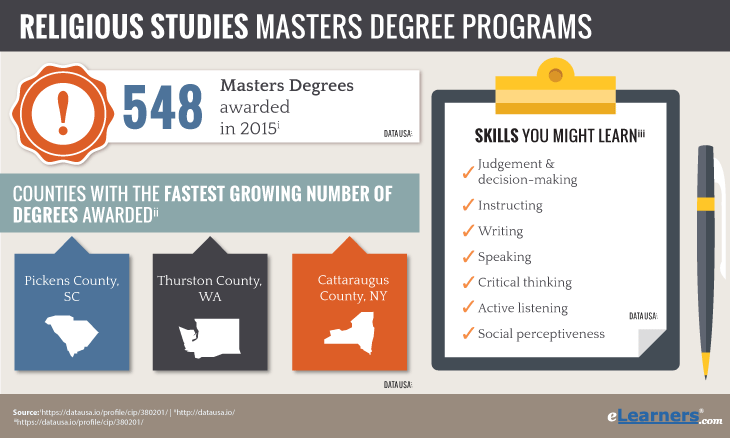Sponsored Online Programs Available
Masters in Religion Online
For people who want to learn about the cross-cultural study of religion in our world, an online masters degree in religious studies can be a great choice. This degree goes beyond the basics of an associate’s or bachelor’s degree, allowing students to plunge into their research with greater depth. Online religious studies programs generally offer the option to study Eastern religions as well as Western religions.
What Do People Do in an Online Masters Degree in Religious Studies?
Whether you’re interested in Christianity, Buddhism, Judaism or other religious traditions, this degree can be a good way to learn about the comparative and critical study of religions. The curriculum might include study of ethnography, anthropology, research methods, theories of religion or even documentary filmmaking across religious cultures.[i]
An online master’s in religious studies often concludes with a carefully researched thesis on a topic of personal interest to the student. If you’re comfortable doing a lot of self-directed reading and writing about topics that are important to you, you might be a great candidate for this sort of program.
Typical Coursework for a Master’s in Religious Studies
The selection of coursework for a master’s in religious studies may depend to some extent on the focus of the individual school and the individual student. A typical curriculum of an online masters degree in religious studies might look approximately like this:[ii]
- History of Abrahamic Religions
- History of Non-Abrahamic Religions[ii]
- Ethics and Religion
- Religious Dimensions of Human Experience[iv]
- The Problem of Evil
- Religion and Psychology
- Women and Religion
The curriculum of an online masters degree in religious studies may be filled out with courses on research methods and a selection of elective courses. These electives can be an important part of a well-rounded experience with the curriculum. They help students find their own specific interests and pave the way for avenues of further research.
Once students complete coursework, they might finish an online master’s in religious studies by writing a thesis. People who choose the thesis track for their master’s degree might also decide to go on to a PhD and a possible academic career, even publishing articles and books in their chosen field of study.
Skills to Develop for a Masters in Religion
If you like researching and writing about the big questions in the universe, this may be a good degree choice for you. People who want to pursue an online masters degree in religious studies should develop the following skills:[iii]
- Excellent reading comprehension
- Active listening skills
- Good judgment and decision making
- Social perceptiveness
- Complex problem solving skills
- Good time management
The last of these skills is especially important for prospective students. If you don’t have the self-discipline to do a lot of reading and study at your own pace, a master’s degree in this sort of field might not be an ideal choice. Writing a master’s thesis requires especially good time management.
Career Options After an Online Master’s in Religious Studies
Once you’ve earned a master’s degree in religion, you have a broad range of options available for you to pursue. Some people choose to go on to careers in the ministry. The challenging coursework for this master’s degree might be a great help to prepare you to pursue a career as a priest, rabbi, minister, missionary or other religious professional.
What do ministry professionals do for a living? According to O*Net, this career involves a lot more than studying sacred texts all day. Clergy with a master’s in religious studies may do all of the following things on a daily basis:[iv]
- Resolving Conflicts and Negotiating with Others — Handling complaints, settling disputes, and resolving grievances and conflicts, or otherwise negotiating with others.
- Assisting and Caring for Others — Providing personal assistance, attention, emotional support or other personal care to others such as coworkers, customers or patients.
- Organizing, Planning and Prioritizing Work — Developing specific goals and plans to prioritize, organize and accomplish your work.
- Communicating with Persons Outside Organization — Communicating with people outside the organization, representing the organization to customers, the public, government and other external sources.
- Establishing and Maintaining Interpersonal Relationships — Developing constructive and cooperative working relationships with others, and maintaining them over time.
- Getting Information — Observing, receiving and otherwise obtaining information from all relevant sources.
- Interpreting the Meaning of Information for Others — Translating or explaining what information means and how it can be used.
- Training and Teaching Others — Identifying the educational needs of others, developing formal educational or training programs or classes, and teaching or instructing others.
This path can be an involved career and with fulfilling personal rewards. According to the Bureau of Labor Statistics, clergy in America currently earn a median annual wage of $41,730. An online masters degree in religious studies might be an ideal choice for you if you want to explore the intricacies of religion in a way that helps you prepare for a possible career in the field.
[i]colorado.edu/admissions/graduate/programs/religious [ii]catalog.gsu.edu/graduate20142015/religious-studies/ [iii]onetonline.org/link/summary/21-2011.00 [iv]onetonline.org/link/summary/21-2011.00 [v]bls.gov/oes/2008/may/oes212011.htm


